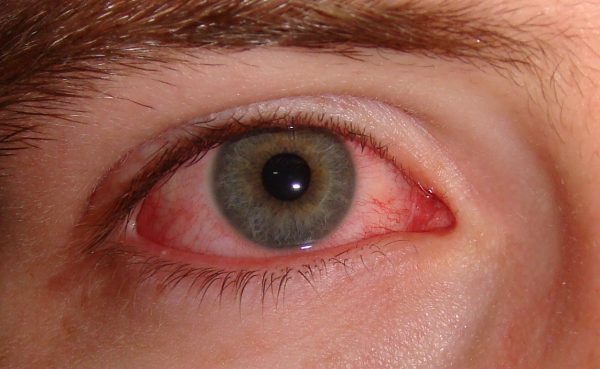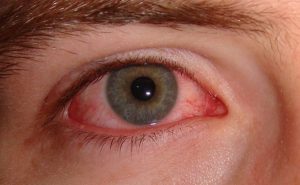
Keratitis – causes, side effects and treatments at NaturalPedia.com
Thursday, May 03, 2018 by Zoey Sky
http://www.naturalpedia.com/keratitis-causes-side-effects-and-treatments-at-naturalpedia-com.html

Keratitis is the medical term for inflammation of the cornea. The cornea is the transparent outer layer at the front of the eye and it helps the eye focus so it can see objects clearly.
When an individual has keratitis, their cornea becomes inflamed. This inflammation may be very painful. Additionally, keratitis can cause vision problems and make the affected eye more light-sensitive.
The condition doesn’t have a single cause. There are different types of keratitis, and each may require different treatment. There are two main types of keratitis: infectious and noninfectious.
There are various forms of the condition for these two types.
Noninfectious causes of keratitis may include:
- An allergy (e.g. to cosmetics or pollution)
- An irritant lodged in the eye
- A vitamin A deficiency
- Exposure to intense sunlight (e.g. from water or snow)
- The eye drying out (e.g. if the eye does not produce enough tears)
- Injury to the cornea
- Wearing contact lenses for too long
Infectious types of keratitis may include:
- Bacterial — Often caused by dirty contact lenses.
- Fungal — Usually due to an eye injury from a plant or tree branch.
- Parasitic — Can be caused by a tiny organism usually found in lakes and rivers.
- Viral — May be caused by an infection with the herpes simplex virus or herpes zoster virus.

Known side effects of keratitis
The side effects of keratitis usually include:
- Blurred vision
- Difficulty keeping the eyelids open
- Feeling like there’s something, such as sand, in the eye
- Pain
- Red eye
- Sensitivity to light
- Watery eye
Risk factors for keratitis may include:
- A decrease in the quality or quantity of tears — This predisposes the eye to the development of keratitis.
- Any break or disruption of the epithelium (surface layer) of the cornea — This is a major risk factor for the development of keratitis.
- Disturbances in immune function — This can be caused by diseases like AIDS or the use of medications (e.g. corticosteroids) or chemotherapy.
- Use of contact lenses — This increases the risk of developing keratitis, especially if a person has poor hygiene, is using improper solutions to store and clean the lenses, the contact lenses are worn improperly, or even if there are irritants.
Body systems harmed by keratitis
Keratitis may cause the following complications:
- Blindness
- Glaucoma — This is a condition involves pressure inside the eye that may cause vision problems.
- Loss of vision
- Permanent scarring
- Ulcers on the cornea
However, if diagnosed early enough keratitis is often treatable.
Food items or nutrients that may prevent keratitis
The following foods or nutrients can help prevent keratitis:
- Almonds — Almonds are full of vitamin E that can slow macular degeneration. Eat a handful, or an ounce, of almonds daily.
- Citrus and berries — Citrus and berries are full of vitamin C that can lower the risk of developing macular degeneration and cataracts.
- Eggs — Egg yolks are rich in lutein and zeaxanthin, two antioxidants which can help lower the risk of developing macular degeneration and cataracts. Additionally, yolks have zinc that can also help lower macular degeneration risk.
- Fatty fish — Fatty fish like anchovies, mackerel, salmon, trout, and tuna contain docosahexaenoic acid (DHA), a fatty acid found in the retina. Low levels of DHA are connected with dry eye syndrome.
- Leafy greens — Leafy greens are also rich in lutein and zeaxanthin.
Treatments, management plans for keratitis
Treatment of keratitis often depends on the cause of the condition.
- If there is mild injury to the cornea (e.g. a scratched cornea), there is no specific treatment required. A healthcare professional may prescribe an antibiotic ointment for comfort.
- If the keratitis is due to herpes simplex or the herpes zoster virus that causes shingles, a healthcare professional will prescribe antiviral eye drops, an antiviral oral medication, or both. Bacterial keratitis requires antibiotics.
- If the keratitis is caused by ocular dryness, patients may be prescribed artificial tears for lubrication.
- If the keratitis caused by an autoimmune disease, it is usually treated with topical corticosteroid eye drops. Treating the underlying disease can also help the keratitis heal with a lower chance of recurrence.
Where to learn more
- Eye Health: Why It’s More Important Than You Might Think
- Homemade Tamarind Paste For Your Overall Health
- Maintain good eye health with food
- More Cases of Eye Infections Linked to Recalled Contact Lens Solution (press release)
- Washing your contact lenses with tap water could result in blindness
Summary
Keratitis is the medical term for inflammation of the cornea. The cornea is the transparent outer layer at the front of the eye and it helps the eye focus so it can see objects clearly. When an individual has keratitis, their cornea becomes inflamed. This inflammation may be very painful. Additionally, keratitis can cause vision problems and make the affected eye more light-sensitive.
The side effects of keratitis may include pain, red eye, sensitivity to light, and watery eye.
Risk factors for keratitis may include a decrease in the quality or quantity of tears, any break or disruption of the epithelium (surface layer) of the cornea, disturbances in immune function, or use of contact lenses.
Keratitis may cause complications like blindness, glaucoma, loss of vision, permanent scarring, or ulcers on the cornea.
Foods like almonds, citrus and berries, eggs, fatty fish, or leafy greens can help prevent keratitis.
Treatment of keratitis often depends on the cause of the condition. If there is mild injury to the cornea (e.g. a scratched cornea), there is no specific treatment required. If the keratitis is due to herpes simplex or the herpes zoster virus that causes shingles, a healthcare professional will prescribe antiviral eye drops, an antiviral oral medication, or both. If the keratitis is caused by ocular dryness, patients may be prescribed artificial tears for lubrication. If the keratitis caused by an autoimmune disease, it is usually treated with topical corticosteroid eye drops.
Sources include:
Tagged Under: Tags: keratitis





